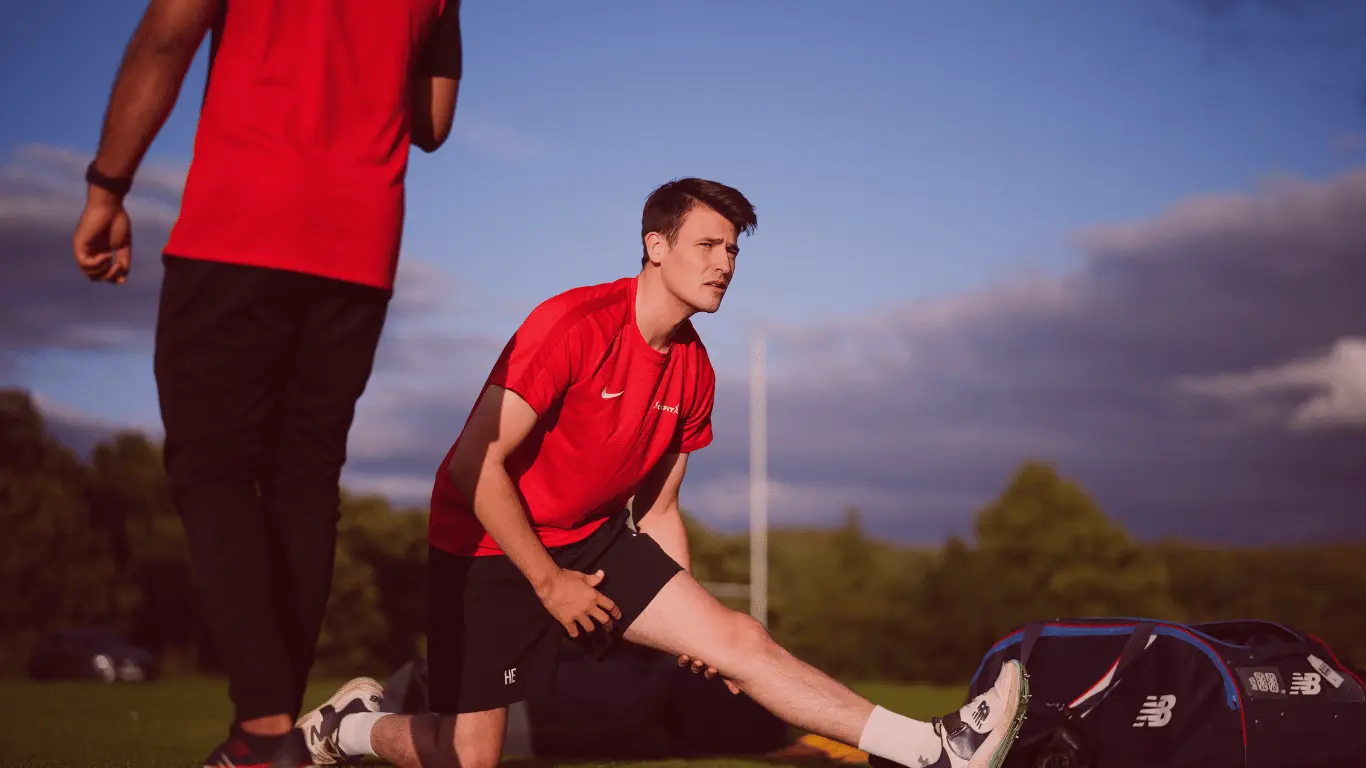Lower Body Stretching for Cricketers
Lower body stiffness is one of the most common performance killers in cricket. Whether you're a fast bowler, batter or all-rounder, tight hips, hamstrings and calves can slowly rob you of speed, power and control over time.
In this article, we’re breaking down a full approach to lower body stretching, built from scientific principles, applied in the gym, and refined through real cricketer feedback. If you’re a cricketer and want to move better, this guide is for you.
Why lower body flexibility matters in cricket
You don’t have to be able to touch your toes or do the splits, but a base level of flexibility is essential for:
- Efficient sprinting mechanics
- Powerful rotation through the hips
- Executing paticular techniques
- Recovering from long days in the field
Over time, without proper stretching, your muscles adapt to shortened positions, especially if you spend a lot of time sitting.
Tight hip flexors, hamstrings and glutes reduce your ability to generate force through full range, often leading to compensations higher up (e.g. lower back or shoulder pain).
Before Training
Before you even think about a cricket session or a gym lift, your lower body needs preparation. The aim isn’t just to “warm up” in a vague sense but to actively shift your body into a state of readiness. Think of your hips and ankles like hinges. If those hinges are rusted shut from sitting at a desk or driving, you can’t expect smooth movement when it’s time to sprint or bowl.
What we’re looking for is a short 5–8 minute routine that increases blood flow, opens key joints, and gets your brain connected to your body. Studies consistently show that dynamic warm-ups reduce the chance of injury and help performance on the field (Behm et al., 2016). But this isn’t about frantically flapping your arms or doing lazy lunges. It’s about mindful movement, getting into the shapes you’ll use when you bowl, bat or field, and gradually expanding your range. By the end, your movements should feel smoother, easier, and more deliberate.
During Training
The idea of "stretching during training" might seem strange. You’re busy lifting, sprinting or bowling...why would you pause for mobility?
But here’s the truth: if your training plan is smart, it already includes mobility work. Strength through length is one of the most powerful tools in modern training. Exercises like split squats or Romanian deadlifts aren't just building muscle, they’re gently coaxing your joints into better positions, under load, where those changes actually stick. Let’s say you’re doing goblet squats with good depth. That’s loaded hip and ankle mobility right there. These movements build resilience. They teach your body to find length and control, not just at rest, but under pressure.
After Training
When the session ends, your job isn’t done. This is your window to recover and restore. Static stretching might have fallen out of fashion in some circles, but when used correctly after training it has powerful effects. It’s where your nervous system gets the signal that it’s time to switch gears: from tension and output to recovery and repair. Post-session stretching helps prevent the slow tightening that can accumulate from week to week. Done consistently, it improves long-term flexibility and reduces the chances of building up imbalances or chronic stiffness (Simic et al., 2013). This isn’t punishment, it’s preparation for the next session.
What the research says
- Static stretching after training supports recovery without affecting strength or power long-term (Simic et al., 2013)
- Dynamic warm-ups improve performance and reduce injury risk (Behm et al., 2016)
- Hip flexor tightness and ankle stiffness are linked to back and knee issues in cricketers (Van Dyk et al., 2019)
- Active mobility work embedded in strength training outperforms passive methods (Schoenfeld et al., 2020)
- Nasal breathing helps downregulate the nervous system and supports stretching post-session (Nester et al., 2021)
Lower body stretching isn’t a quick fix, it’s a long-term investment. But done consistently, it unlocks better mechanics, fewer injuries and improved performance.
Cricket isn’t just about skill. Your body is the vehicle that delivers that skill. And if you're not moving well, you’re playing with the handbrake on.
Start small. Stay consistent. And stretch with purpose.
👉 Want a lower body flexibility plan built specifically for cricketers? Check out our Mobility Basics Programme inside the Cricfit App.
References
Behm, D.G., Blazevich, A.J., Kay, A.D. and McHugh, M. (2016). Acute effects of muscle stretching on physical performance, range of motion, and injury incidence in healthy active individuals: a systematic review. Applied Physiology, Nutrition, and Metabolism, 41(1), pp.1-11.
Nester, C. et al. (2021). The benefits of nasal breathing in sports recovery. Journal of Human Performance and Health, 10(2), pp.123–129.
Schoenfeld, B.J. et al. (2020). Stretching in the context of resistance training: a systematic review. Sports Medicine, 50(5), pp.943-959.
Simic, L., Sarabon, N. and Markovic, G. (2013). Does pre-exercise static stretching inhibit maximal muscular performance? A meta-analytical review. Scandinavian Journal of Medicine & Science in Sports, 23(2), pp.131-148.
Van Dyk, N. et al. (2019). Mechanical risk factors for lower limb injuries in cricket fast bowlers: A systematic review. Journal of Science and Medicine in Sport, 22(5), pp.532–540.

















